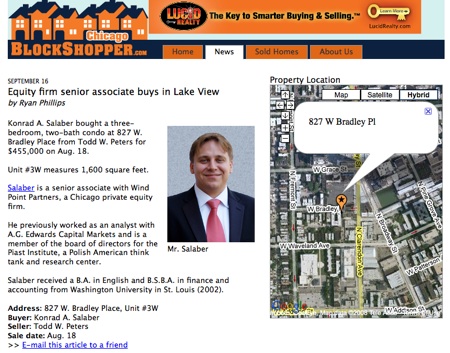Large Chicago law firm Jones Day is suing a tiny Internet startup called BlockShopper over the use of the humble hyperlink. But BlockShopper has picked up a pair of allies in the form of the EFF and Public Citizen, and the two groups jointly filed an amici curiae brief with the court that points out the obvious: "linking is what web sites do—that is, after all, why it is called the 'World Wide Web'."
BlockShopper's transgression, such as it is, appears to be the posting of public information. The site shows which partners, lawyers, philanthropists, and executives have purchased properties in specific city neighborhoods, and it incurred Jones Day's legal wrath after showing the new purchases of two Jones Day lawyers. The company sued on trademark grounds, claiming that the use of its name and web link on the site were illegal.
Last Friday, two public interest groups have stepped up to the plate and weighed in on the case because of its implications for the Web. The BlockShopper case has "potentially significant implications for other online speakers," says their filing, which is putting it mildly.

BlockShopper.com
Should the case go in Jones Day's favor, the entire nature of the Web could be attacked by companies looking to harass bloggers or stifle criticism. Creating a "permission-based" culture of linking would strike at the Web's key feature. As the filing notes, "if Jones Day's trademark theory were correct, no news site or blog could use marks to identify markholders, or links to point to further information about the markholders, without risking a lawsuit.
"But," the filing continues, "Jones Day is wrong."
Fair use
For one thing, the brief disputes Jones Day's claim that BlockShopper's use of its trademark is "confusing." ("No reasonable consumers could look at the headline in the article... and be confused about whether they were looking at a web site sponsored by Jones Day," it says.)
 But, more importantly, trademark law contains a long-standing limit known as "nominative fair use." As the name suggests, this allows writers, competitors, and people talking around the water cooler to use trademarked names ("Apple," "Xerox," "Hoover") for the purpose of naming something accurately.
But, more importantly, trademark law contains a long-standing limit known as "nominative fair use." As the name suggests, this allows writers, competitors, and people talking around the water cooler to use trademarked names ("Apple," "Xerox," "Hoover") for the purpose of naming something accurately.
This is allowed so long as the use is truly needed to identify a service or product, it was only used enough to identify the product or service, and no endorsement from the trademark owner is implied.
It's one of the key arguments that BlockShopper made in its own motion to dismiss the case, filed last Friday. Oddly enough, the nominative fair use exception has roots in the boy band "New Kids on the Block," which sued several newspapers back in 1992 for running a 900-number poll that asked questions like, "Which one of the New Kids is the most popular?"
A Ninth Circuit judge noted that "most useful social and commercial discourse would be all but impossible if speakers were under threat of an infringement suit every time they made reference to a person, company or product by using its trademark."
Piercing the veil
So is Jones Day just out to play a little hardball with a site that was making some public-yet-still-sorta-"private" financial information known? It's impossible to judge motives, but the law firm has been aggressive in its filing, extending them to include personal liability for the two cofounders of BlockShopper, which is an LLC, simply because they run the site.
BlockShopper's attack on this point is full of finely-honed outrage (individuals who work for companies cannot be held personally liable for corporate actions except in extraordinary circumstances).
"Based on Jones Day's paper-thin allegations against [the cofounders of BlockShopper]," reads the motion, "there is no basis to pierce the corporate veil of BlockShopper LLC and attach any personal liability to these members of the LLC."
The motion requests the entire case to be thrown out; with both sides having filed and amici weighing in, it's now up to a federal judge here in Chicago to determine if the case actually goes to trial.
reader comments